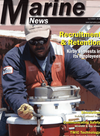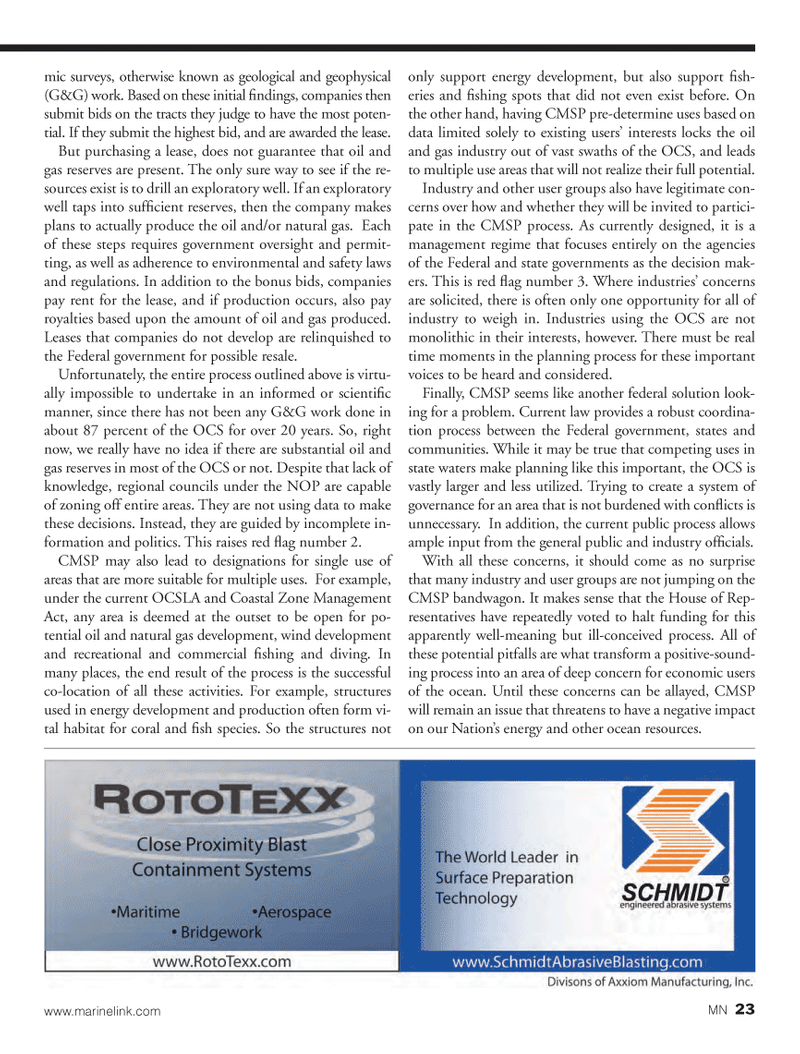
Page 23: of Marine News Magazine (October 2013)
Manning: Recruitment & Retention
Read this page in Pdf, Flash or Html5 edition of October 2013 Marine News Magazine
mic surveys, otherwise known as geological and geophysical (G&G) work. Based on these initial Þ ndings, companies then submit bids on the tracts they judge to have the most poten- tial. If they submit the highest bid, and are awarded the lease. But purchasing a lease, does not guarantee that oil and gas reserves are present. The only sure way to see if the re- sources exist is to drill an exploratory well. If an exploratory well taps into sufÞ cient reserves, then the company makes plans to actually produce the oil and/or natural gas. Each of these steps requires government oversight and permit- ting, as well as adherence to environmental and safety laws and regulations. In addition to the bonus bids, companies pay rent for the lease, and if production occurs, also pay royalties based upon the amount of oil and gas produced. Leases that companies do not develop are relinquished to the Federal government for possible resale. Unfortunately, the entire process outlined above is virtu- ally impossible to undertake in an informed or scientiÞ c manner, since there has not been any G&G work done in about 87 percent of the OCS for over 20 years. So, right now, we really have no idea if there are substantial oil and gas reserves in most of the OCS or not. Despite that lack of knowledge, regional councils under the NOP are capable of zoning off entire areas. They are not using data to make these decisions. Instead, they are guided by incomplete in- formation and politics. This raises red ß ag number 2. CMSP may also lead to designations for single use of areas that are more suitable for multiple uses. For example, under the current OCSLA and Coastal Zone Management Act, any area is deemed at the outset to be open for po- tential oil and natural gas development, wind development and recreational and commercial Þ shing and diving. In many places, the end result of the process is the successful co-location of all these activities. For example, structures used in energy development and production often form vi- tal habitat for coral and Þ sh species. So the structures not only support energy development, but also support Þ sh-eries and Þ shing spots that did not even exist before. On the other hand, having CMSP pre-determine uses based on data limited solely to existing usersÕ interests locks the oil and gas industry out of vast swaths of the OCS, and leads to multiple use areas that will not realize their full potential. Industry and other user groups also have legitimate con- cerns over how and whether they will be invited to partici- pate in the CMSP process. As currently designed, it is a management regime that focuses entirely on the agencies of the Federal and state governments as the decision mak- ers. This is red ß ag number 3. Where industriesÕ concerns are solicited, there is often only one opportunity for all of industry to weigh in. Industries using the OCS are not monolithic in their interests, however. There must be real time moments in the planning process for these important voices to be heard and considered. Finally, CMSP seems like another federal solution look- ing for a problem. Current law provides a robust coordina- tion process between the Federal government, states and communities. While it may be true that competing uses in state waters make planning like this important, the OCS is vastly larger and less utilized. Trying to create a system of governance for an area that is not burdened with conß icts is unnecessary. In addition, the current public process allows ample input from the general public and industry ofÞ cials. With all these concerns, it should come as no surprise that many industry and user groups are not jumping on the CMSP bandwagon. It makes sense that the House of Rep- resentatives have repeatedly voted to halt funding for this apparently well-meaning but ill-conceived process. All of these potential pitfalls are what transform a positive-sound- ing process into an area of deep concern for economic users of the ocean. Until these concerns can be allayed, CMSP will remain an issue that threatens to have a negative impact on our NationÕs energy and other ocean resources. www.marinelink.com MN 23MN October2013 Layout 18-31.indd 23MN October2013 Layout 18-31.indd 239/30/2013 11:21:50 AM9/30/2013 11:21:50 AM

 22
22

 24
24
